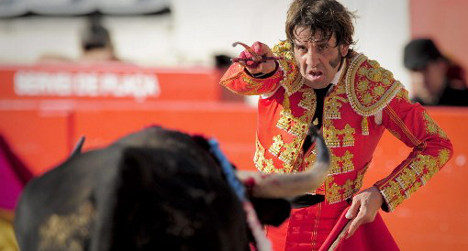BAN
Madrid battles Catalan bullfight ban
Catalonia's controversial bullfighting ban may soon be a thing of the past after the Spanish parliament agreed to talks on whether the sport is an "asset of cultural of interest".
Published: 13 February 2013 17:17 CET

Catalonia's government voted to ban bullfighting from January 1st 2012. Photo: Josep Lago/AFP
Spain's parliament agreed on Tuesday to debate declaring bullfighting a national cultural treasure – a step towards possibly reinstating it in the Catalonia region where it was banned a year ago.
A petition organised by the Catalan Bullfighting Federation signed by nearly 600,000 people states that "bullfighting belongs to Spain's global culture, and to the historical and cultural patrimony common to all Spaniards".
It calls for the centuries-old tradition, branded barbaric by animal rights groups, to be declared an "asset of cultural interest", which would give bullfighting greater legal and financial protection.
The lower house of parliament voted to allow a debate on the proposal, with 180 votes in favour, 40 against and 106 abstentions.
Prime Minister Mariano Rajoy's conservative Popular Party holds an absolute majority in the parliament, making it likely the bill will pass into law.
The party hopes declaring bullfighting a cultural asset will lead to a reversal of bans on the practice in place in Catalonia and the Canary Islands.
"This is not going against Catalonia, on the contrary," Popular Party lawmaker Juan Manuel Albendea told AFP.
"We want bullfighting to return to Catalonia with agreements, not under duress."
Dozens of supporters of the bill, some with pink bullfighting capes, demonstrated outside the parliament as lawmakers gathered.
"We have to defend this country's traditions and culture," said one demonstrator, Pablo Ruiz, 27, a novice bullfighter.
See 2011 protests for and against bullfighting outside Barcelona's main arena:
The effort to restore bullfighting in Catalonia will likely stoke tensions with the government of the wealthy northeastern region, which has promised to hold a referendum on independence from Spain next year.
Catalonia's regional parliament voted in July 2010 to ban the sport from January 2012 after animal rights groups garnered 180,000 signatures for a petition demanding a debate on the issue.
It was the first region in mainland Spain to ban the tradition, following a similar move by the Canary Islands in 1991.
Critics say the move was as much about Catalonia — which has its own distinct language and culture — underlining its regional identity as an issue of animal rights.
"We will not surrender and we will fight to preserve a decision by the Catalan people that was adopted by their representatives", said the spokesman for the left-wing Catalan nationalist party Esquerra Republicana, Alfred Bosch.
"There is a nationalist Spanish dimension to this, of pride. Since the vote in the Catalan parliament there have been voices, especially in the Popular Party, which vowed to avenge it and now they are trying to," he told AFP.
Url copied to clipboard!


 Please whitelist us to continue reading.
Please whitelist us to continue reading.
Member comments